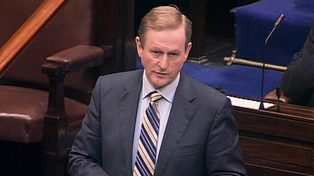Mr Kenny was responding in the Dáil to Sinn Féin leader Gerry Adams, who said you cannot cut your way out of recession and the fiscal treaty would cost taxpayers money.
Mr Adams asked the Taoiseach to tell people what the "real cost" of the treaty would be.
Mr Kenny said a Yes vote would mean further confidence which in turns means more jobs.
But the Taoiseach accepted the treaty was not a "panacea" to all of Europe's problems, however he added, it was part of the process towards recovery.
Later, Socialist Party TD Joe Higgins called for the Minister for Finance to go into the Dáil to explain his comments yesterday about a tougher Budget if the treaty is rejected.
Mr Higgins said the comments were "utterly false" and he urged the Government to "give us clarity rather than threats".
PBPA launches campaign
The People Before Profit Alliance has launched its campaign for a No vote in the fiscal treaty, calling on the Government to debate what is actually in the treaty.
Richard Boyd Barrett said the beginning of wisdom, and the beginning of recovery, was to vote against the treaty.
He said there was a lot of talk about a second bailout, but asked why we would want a second bailout when the first had imposed such austerity.
Asked how the alliance would propose paying for State services, as well as introducing a stimulus package in the absence of such a bailout, Mr Boyd Barrett said they would refuse to pay bank debts, which he described as "the gambling debts of private companies".
He said this would make Ireland's Budget deficit much easier to deal with, as it would remove about 40% of it.
Mr Boyd Barrett said the remainder could be met, or almost met, through a combination of higher taxes on those earning over €100,000 and a wealth tax.
People Before Profit said its budget for the campaign was "very small", but they hoped to compensate for that lack of money with a grass roots campaign, which would be more effective.
Michael Noonan defends budget remarks
Minister for Finance Michael Noonan has staunchly defended his remarks on the possibility of a No vote in the fiscal treaty referendum making December's Budget more difficult, saying that he was leveling with the Irish people.
He accused Sinn Féin of being "afraid of the truth" and denied he was trying to scare the electorate.
Speaking in Brussels, Mr Noonan insisted that planning the next Budget would be made more difficult.
He said that if growth or confidence in the economy were lowered by a No vote then the Government would be advised both by the Fiscal Council and the external EU-IMF authorities to "speed up the progress of adjustment".
Growth could be lowered if investment decisions were deferred, and if confidence were to "seep out of the economy".
He said in such circumstances the Government's growth forecast for next year would have to be lowered.
"What I said is that planning the next Budget will be more difficult and that is a considered statement," Mr Noonan said.
"If there's a No vote it will create uncertainty, it will create a lack of confidence in the economy and it will have an effect on investment decisions, both external and internal.
“Some will be deferred, others will be cancelled, and as a consequence we'll have to mark down growth rates for next year.
"In meeting budgetary targets there are three ways of doing it, you tax, you cut spending, or you allow growth to do the heavy lifting.
"On next year's profiles we're looking at 2.2% of GDP growth. The uncertainty caused by a no vote will cause that to come down, and consequently that would make my job more difficult in planning the next budget."
Jobs and growth focus
Meanwhile, Tánaiste Eamon Gilmore has said that he shares the aspiration of French presidential election candidate Francois Hollande to push, if elected, for a renewed jobs and growth agenda in the fiscal treaty.
Speaking at the Institute for European Affairs, the Minister for Foreign Affairs said Ireland could not have growth without stability, as measures to stimulate jobs and investment could only be taken on the stable surface which the treaty would provide.
He said just as joining the euro had been the right decision for Ireland, defending it was the correct decision now.
The treaty, he argued, was a necessary part of the solution to the problems being faced by the currency now.
Voting Yes for the treaty, he said, would be a vote for recovery, while a vote against would be a vote for austerity.


No comments:
Post a Comment